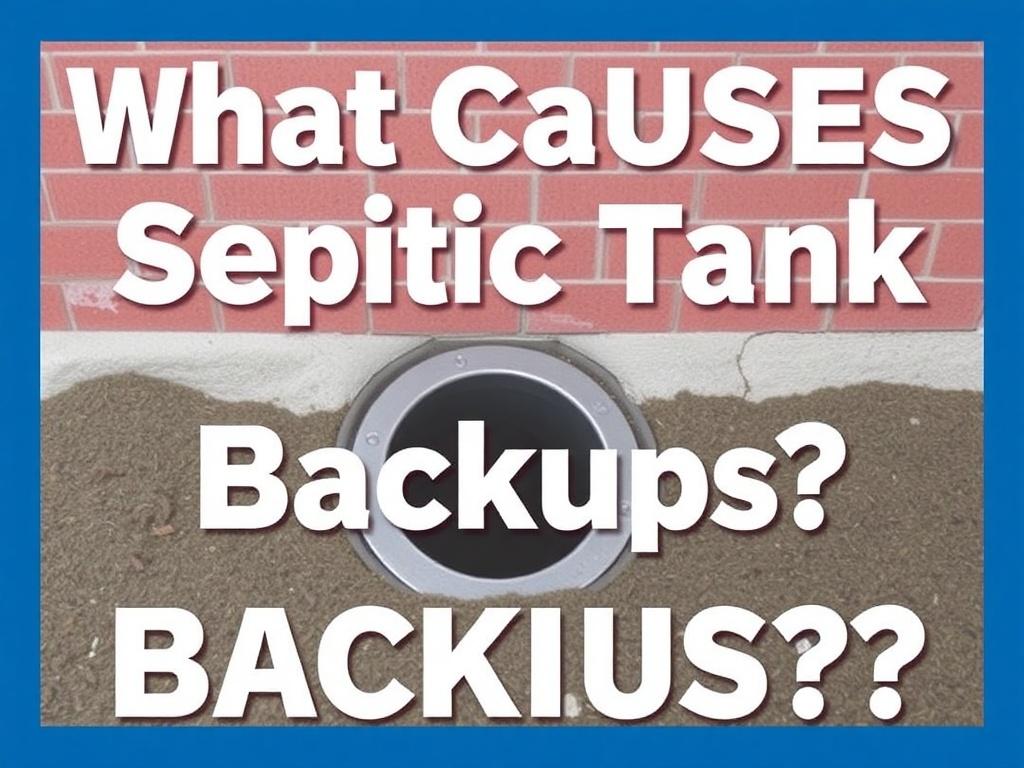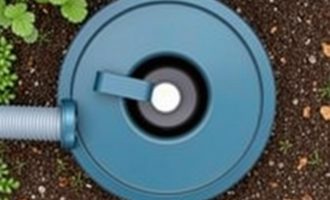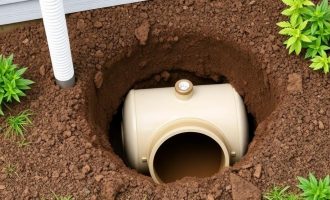- Introduction to Septic Tank Backups
- How Does a Septic System Work?
- Common Causes of Septic Tank Backups
- 1. Lack of Regular Maintenance
- 2. Excessive Water Usage
- 3. Clogged or Broken Pipes
- 4. Drain Field Failure
- 5. Flushing the Wrong Items
- 6. Tree Root Intrusion
- 7. Structural Damage or Age of the System
- Signs of a Septic Tank Backup
- Preventative Measures to Avoid Septic Tank Backups
- Regular Inspection and Pumping
- Water Conservation Practices
- Proper Waste Disposal
- Landscape Considerations
- Use Bacteria Additives Carefully
- Table: Common Causes of Septic Tank Backups and Solutions
- When to Call a Professional
- Additional Tips for Maintaining a Healthy Septic System
- Understanding the Signs Early: Don’t Ignore Minor Problems
- Environmental Impact of Septic Tank Backups
- Conclusion
Introduction to Septic Tank Backups
Septic tanks play a crucial role in managing household wastewater for many homes, especially those not connected to a central sewer system. However, like any system, they can encounter problems. One of the most frustrating and unpleasant issues homeowners face is a septic tank backup. Septic tank backups can lead to foul odors, water damage, and costly repairs. Understanding what causes septic tank backups is critical for preventing this messy problem and maintaining a healthy, functioning septic system.
In this article, we will explore the common reasons for septic tank failures, break down how a septic system works, and provide helpful tips to avoid backups. By the end, you’ll have a clear understanding of what causes septic tank backups and how to keep your system running smoothly.
How Does a Septic System Work?
Before diving into what causes septic tank backups, it’s important to understand how a typical septic tank system functions. A septic system consists of two main parts: the septic tank itself and the drain field (also called a leach field). The septic tank collects wastewater from your home, allowing solids to settle at the bottom while oils and grease float to the top. The liquid effluent between these layers then drains into the drain field, where it is naturally filtered through the soil.
If any part of this process is interrupted or overwhelmed, the system may malfunction, leading to a backup. Knowing the basics of septic operation will help illustrate how backups occur.
Common Causes of Septic Tank Backups

Septic tank backups are often the result of one or more factors disrupting the normal flow or treatment of wastewater. Below is a detailed look at some of the most common causes that lead to these backups.
1. Lack of Regular Maintenance
One of the primary causes of septic tank backups is neglect in regular septic tank pumping and inspection. Over time, solids accumulate in the tank and reduce its capacity. If these solids are not removed, they can overflow into the drain field or clog pipes, causing wastewater to back up into the home.
– Most experts recommend pumping the septic tank every 3 to 5 years.
– Homes with larger families or higher water usage may require more frequent maintenance.
2. Excessive Water Usage
Too much water entering the septic system at once can overwhelm it, causing wastewater to back up. This can happen due to activities such as:
- Frequent or simultaneous laundry loads
- Running multiple showers or faucets simultaneously
- Fixing leaks too late
Constant heavy water flow doesn’t allow enough time for the wastewater to separate in the tank or for the drain field to absorb the liquid efficiently.
3. Clogged or Broken Pipes
Pipes play a vital role in transporting wastewater from your home to the septic tank and then to the drain field. Pipes can become clogged with debris, tree roots, or hardened grease, disrupting the flow.
Damage to pipes from shifting soil or construction can also impede wastewater flow, causing backups. Regular inspection helps catch these problems early before full backup occurs.
4. Drain Field Failure
The drain field is the part of the septic system that absorbs and treats the liquid effluent. It is made up of trenches or beds filled with gravel or other porous materials that allow percolation into the soil.
Drain field failure is common and caused by:
- Soil compaction from heavy vehicles parking over the field
- Saturation due to excessive water or poor drainage
- Blockages from solids entering the field
Once the drain field becomes clogged or saturated, the septic tank can no longer drain, resulting in backups.
5. Flushing the Wrong Items
Many homeowners unintentionally cause septic tank backups by flushing non-biodegradable materials such as:
- Wet wipes and paper towels
- Feminine hygiene products
- Diapers and cotton balls
- Grease and fats
These items do not break down in the septic system and can clog pipes and the tank. Always remember only to flush toilet paper and human waste.
6. Tree Root Intrusion
Tree roots are notorious for infiltrating septic systems. Seeking moisture, roots can invade pipes and the septic tank, causing blockages or pipe damage. Avoid planting trees or shrubs too close to your septic system to prevent this issue.
7. Structural Damage or Age of the System
Over time, septic tanks and their components may deteriorate due to corrosion, groundwater infiltration, or physical damage. Older systems are more prone to cracking or failure, which can disrupt the wastewater flow and cause backups.
Signs of a Septic Tank Backup
Recognizing early signs of septic tank backups can save homeowners major headaches and expenses. Here are some common symptoms to watch out for:
- Slow draining sinks, tubs, or toilets
- Gurgling sounds in the plumbing
- Unpleasant odors around the house or septic tank area
- Standing water or soggy ground near the drain field
- Backflow of sewage into drains or toilets
If you notice any of these signs, it’s essential to call a septic professional immediately to assess and address the problem.
Preventative Measures to Avoid Septic Tank Backups

Fortunately, septic tank backups are often preventable with proper care and attention. Below are practical steps you can take to keep your septic system functioning optimally.
Regular Inspection and Pumping
Scheduling routine septic inspections and pumping every few years is the single most effective way to prevent backups. A professional can remove accumulated solids and check for any damage to your system.
Water Conservation Practices
Reducing excessive water use helps protect your septic system from overload. Some helpful tips include:
- Fix leaks promptly
- Run dishwashers and laundry machines with full loads only
- Install high-efficiency fixtures
- Space out water usage throughout the day
Proper Waste Disposal
Avoid flushing anything other than human waste and septic-safe toilet paper. Dispose of grease, oils, chemicals, and personal hygiene products in the trash.
Landscape Considerations
Be mindful when planting trees or shrubs near your septic system. Keep heavy vehicles off the drain field area to refrain from compacting the soil.
Use Bacteria Additives Carefully
Some homeowners use septic tank additives to maintain bacterial balance. However, many experts argue that these are unnecessary with proper maintenance and may even harm your system. Always consult a professional before using additives.
Table: Common Causes of Septic Tank Backups and Solutions
| Cause | Description | Prevention/Solution |
|---|---|---|
| Lack of Maintenance | Solids accumulate and reduce tank capacity | Regular pumping every 3-5 years |
| Excessive Water Usage | System overwhelmed by too much water | Conserve water; fix leaks; stagger water use |
| Clogged/Broken Pipes | Debris, roots, or damage block wastewater flow | Pipe inspections; professional repairs |
| Drain Field Failure | Soil saturation, compaction, or blockages | Keep heavy vehicles off field; proper drainage |
| Flushing Incorrect Items | Non-biodegradable items clog system | Flush only appropriate waste |
| Tree Root Intrusion | Roots penetrate pipes or tank | Avoid planting near septic system |
| Structural Damage | Age-related wear or physical damage | Inspections; timely repairs; system replacement |
When to Call a Professional
Although some septic tank problems can be addressed by homeowners, many aspects require professional expertise. If you experience persistent slow drains, foul odors, or notice pooling water near your tank or drain field, it’s critical to call a septic service expert immediately.
Professionals can use specialized equipment like cameras and flushing tools to diagnose blockages, conduct safe pumping, and advise on system repairs or replacement.
Additional Tips for Maintaining a Healthy Septic System
Here are some final tips to help extend the life of your septic system and avoid backups:
- Avoid pouring grease or harsh chemicals down the drain, as they kill bacteria needed for waste breakdown.
- Install water-efficient appliances to reduce water loads on your septic system.
- Mark your septic tank and drain field locations clearly to avoid accidental damage.
- Ensure your septic tank has a secure, sealed lid for safety and to minimize debris inflow.
- Educate all household members about proper septic usage to prevent inadvertent damage.
Understanding the Signs Early: Don’t Ignore Minor Problems
Many homeowners ignore early warning signs of septic problems, hoping the issue will resolve itself. Unfortunately, septic tank backups usually worsen without professional intervention. Acting at the first sign can prevent more extensive and expensive damage.
Environmental Impact of Septic Tank Backups
Septic backups don’t just affect your home—they can also harm the environment. When wastewater backs up, it may contaminate nearby water sources, posing health risks and polluting ecosystems. Proper septic system maintenance safeguards both your property and the surrounding environment.
Conclusion
Septic tank backups are frustrating problems but understanding what causes septic tank backups puts you in the driver’s seat to prevent them. From neglecting regular maintenance to flushing inappropriate items, many common causes can be avoided with a bit of care. Monitoring water use, scheduling routine pumping, protecting pipes and drain fields, and being mindful of what goes down your drains will help keep your septic system functioning efficiently for years. Should you suspect trouble, consulting a septic professional promptly will save you from costly repairs and unpleasant messes. Ultimately, a well-maintained septic system protects your home, your health, and the environment—making paying attention to its care well worth the effort.
Помогла вам статья?





